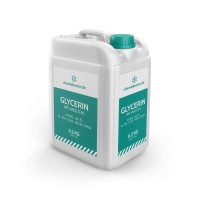Glycerin 86 % (vegetable) - what to consider
What is Glycerin ?
Glycerol is the common name of popane-1,2,3-triol. It is a trivalent alcohol, a polyol. Glycerin is obtained from the cleavage of animal and vegetable fats.
Where is vegetable glycerin found?
Because of its water-binding and fat-barrier properties, vegetable glycerin is used in cosmetics, for example in lotions or creams, and as a formulation ingredient in hand disinfectants. It is also used as a base product in cosmetics and pharmaceuticals. Due to its sweet aroma, vegetable glycerin is often contained in food supplements, e.g. in dietary products. It also serves as a base for e-cigarettes, liquids and shisha tobacco.
What is vegetable glycerin used for?
Thanks to its taste and its ability to bind water, it is often used in the food industry, as it prevents baked goods or other foods from drying out. However, it has many uses, including in the cosmetics industry as a moisturizer and in pharmaceutical applications. It is also used as an antifreeze in technical and food applications, as a lubricant and as a plasticizer in gelatin coatings. It is also used as a solvent, carrier and solubilizer for flavors, dyes, antioxidants, tobacco and enzymes.
How is glycerin produced?
Glycerin is produced by fat cleavage.
In addition, the alcohol can be produced chemically as a co-product in soap production. In the past, mainly animal fats were used for this purpose.
Another very important way to obtain glycerin is in biodiesel production. Here it is produced as a by-product through the transesterification of vegetable oils with methanol.




